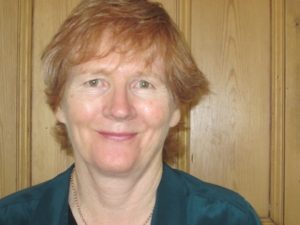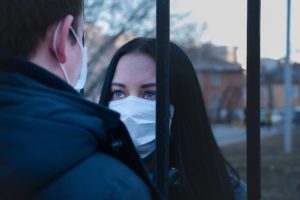The existentialist and the minestrone
by Miriam BurkeKit’s mobile rings at exactly 2.00 pm.
‘Why is everyone booking a time to ring?’
‘It gives a structure to the day,’ says Sarah.
‘The day mightn’t want structure.’
A robin crashes against the bay window in Kit’s first-floor living room.
‘Ouch,’ she says.
‘What?’
‘It’s the robin who flies into my window. I try to frighten him away but he keeps smashing into it.’
‘I know how he feels; it reminds me of my first marriage,’ says Sarah, laughing. ‘It creates an illusion of control.’
‘What does?’
‘Booking times to ring people. How are you?’
‘I miss the planes.’
‘Why?’
‘They drowned out the birds and now I’m woken by the dawn chorus at 4.30,’ says Kit.
‘I can’t believe you sleep through planes but not birdsong.’
‘The birds all sing different tunes; it’s a mess, but the noise from the planes is continuous and low-pitched. And I miss cars.’
‘I suppose you like the scent of air pollution.’
‘I love to see police speeding to the scene of a crime, plumbers hurrying to fix a leak, pink and white vans bringing flowers to a lover. I love busyness,’ says Kit.
‘I’m enjoying the quiet; I feel like I’m living in a village.’
‘You could have moved to the country.’
‘“Could have”; we talk as if there isn’t a future,’ says Sarah.
Kit hears wheels on the footpath under her window.
‘It’s the postman,’ she says. She opens the window and waves.
He holds up a white envelope and shouts: ‘Premium bonds.’
‘It’s never move than twenty-five.’
He puts both hands on the envelope as if he’s about to tear it in two.
‘No!’ shouts Kit.
He laughs, slides the envelope through the letterbox, and says: ‘See you tomorrow.’
She watches his broad red back move slowly down the empty street.
‘He’s friendly,’ says Sarah.
‘He looks like a monkfish.’
‘I’ve only seen them beheaded, covered in sauce.’
‘The vegetables would jump from the plate if the head was left on.’
‘We might die,’ says Sarah. ‘But we probably won’t.’
‘That’s what they thought.’
‘Who?’
‘The dead ones.’
‘I suppose it was.’
My mother turned to me and asked; will you think of me when I’m gone? I felt a surge of rage. I was thinking; she’s trying to control what happens after her death… It would have cost me so little to say I love you, Mum.”
Kit starts walking in circles around her living room. ‘I’m getting images from the past,’ she says.
‘What sort of images?’
‘I was standing on a stone bridge in a medieval town with my mother. I should warn you; I’m going to cry while I tell you this.’
‘That’s okay.’
‘My mother turned to me and asked; will you think of me when I’m gone? I felt a surge of rage. I was thinking; she’s trying to control what happens after her death. I looked away from her and didn’t answer. It would have cost me so little to say; of course I will. Or I love you, Mum.’ She starts sobbing. Sarah doesn’t say anything. ‘And I think about her all the time because I didn’t say those things. Why wasn’t I big enough? She was asking so little of me.’
‘We’re all fuckwits.’
‘I knew at the time what I should have said. But I couldn’t move beyond the rage. She never asked again. The hurt was too deep.’
Her hand is wet with tears.
‘You were there with her. That’s what really matters.’
‘It wasn’t enough.’
‘She might not have attached any importance to it.’
‘I know her, knew her.’
‘We all do it; fail the people we love.’
‘It was such a small thing at the time and it’s all I remember now.’
There is a silence before Sarah says: ‘Ego te absolvo a peccatis tuis in nomine Patris et Filii et Spiritus Sancti.’
‘Where did you get that?’
‘I’ve been reading Graham Greene, and I did A-Level Latin. I’ve always envied you Catholics the confession. It must be so… exhilarating, to be forgiven.’
I would have been one of those mothers who can’t comfort their crying child because the child feels the mother’s cold anger; a mother trapped in a life that’s crushing her.”
Kit sits in an armchair by a fireplace with an empty grate. ‘You had to be seen to go into the box and come out again, quickly. If you were there for longer than a few minutes, everyone would think you were pregnant.’ She dries her wet hand with her T-shirt. ‘Have you been haunted by anything?’
‘I had an abortion.’
‘You never told me.’
‘It was before I met you. She’d be thirty.’
‘They told you it was a girl?’
‘I always knew if I was carrying a girl or a boy. I have a clear picture of what she would look like: she’d have auburn hair and kale green eyes. She’d be musical and would have studied at The Royal College of Music and become a composer.’
‘You think about her a lot?’
‘Lately, yes.’
‘Does Ben know about her?’
‘No, I kept her separate from my family. It was long before I met him.’
‘Is he in the house now?’
‘He’s gone out to see if he can find eggs. I would have been one of those mothers who can’t comfort their crying child because the child feels the mother’s cold anger; a mother trapped in a life that’s crushing her.’
‘You weren’t that kind of mother.’
‘I wasn’t.’
Kit looks over at the brass candlesticks covered in red wax on her dining room table. She remembers an evening of good-tempered arguing, gossip and flirting. The candles are burnt down to the sticks.
‘What else comes back to you?’ asks Sarah.
‘I was at a party one night, a long time ago, and someone I had been talking to earlier came up and asked if they could drive me home. My life would have been very different if I had said yes. And that moment; when I said no, has been coming back to me, again and again.’
‘How would your life have been different?’
‘It would have been… safe. Not boring, it would have been full of good things; art, travel, interesting people. And I would have been loved.’
‘Why did you say no?’
‘I suppose it wasn’t what I wanted. I’d just discovered existentialism and I had a heightened sense of how absurd life is. I used to quote Camus who believed that life is absurd due to the incompatibility between human beings and the world they inhabit. I knew the next morning that I would never again be offered that kind of happiness. I understood what I had given up.’
‘Maybe you could meet again?’
‘Someone else is living the life I could have had. I hear about them sometimes.’
‘I think everyone has someone like that. Are you still an existentialist?’
‘Sort of. It’s more a rejection of other philosophies and religions than a well developed system of thought. It’s applied atheism. Existentialists believe that the only meaning life has is the meaning each individual ascribes to it.’
‘It’s a bit chilling.’
‘That’s existential angst. What would you call yourself?’
‘I’m more of a minestrone; a bit of humanism, some Buddhism, and a little Jainism with some Quaker seasoning.’
‘How do you integrate it all?’
‘I don’t,’ answered Sarah, laughing. ‘It’s a minestrone; lots of little bits floating about.’
Oh, God, I know the woman who lives in that house; she walks her dog in the park… I won’t look. She deserves her dignity.”
Kit hears a siren and she hurries to the window. ‘Can you hear that?’
‘Yes. It’s very near you ’
An ambulance turns into Kit’s road, speeds past her window, and pulls up at the end of the street.
‘It’s stopped,’ says Sarah.
‘Oh, God, I know the woman who lives in that house; she walks her dog in the park.’
Two figures wearing white protective suits and blue masks jump from the ambulance and run to the house.
‘I won’t look,’ says Kit. ‘She deserves her dignity.’
‘Are you okay?’ asks Sarah.
‘Yes.’
Kit looks around the room, seeking comfort from the permanence of objects.
‘She might recover,’ says Sarah.
‘Tell me something else that’s coming back to you.’ Kit sits again by the empty grate.
‘There was a time when everything about Ben drove me into a frenzy of irritation,’ says Sarah. ‘The noises he made when he was eating, his cheerfulness in the morning, the sound of his voice, his huge feet, the smell of his breath, the noisy games he played with the children, the sound of him peeing. Everything was unbearable.’
‘Did he know?’
‘He knew something was wrong. I was trying so hard to control it; I was like a wound-up toy.’
‘When was this?’
‘The kids were small. ’
‘How did you get out of it?’
‘I decided I would treat him with the kindness I’d show a stranger. I got up every morning and behaved as if he was a guest in my house.’
‘And that got you through?’
‘It took a long time but yes.’
‘I don’t think I could do that. I’d feel I wasn’t living authentically.’
‘It wasn’t just about me. Freedom is the price you pay for love.’
‘It’s a high price.’
‘It is. But freedom doesn’t hold you in the night when you’re frightened.’
‘The siren’s started up again,’ says Kit.
‘I can hear it. They got her out quickly. ’
Kit starts circling the room again. ‘Sarah…’
‘Yes.’
‘I met her in the park about a week ago. We chatted.’
‘Did she seem ill?’
‘No.’
‘Did you stand near her?’
‘I don’t think so.’
‘You’ll be fine.’
‘I wouldn’t mind pain, or being dead. It’s just such a lonely way to go.’
‘You won’t be alone.’
‘Everyone is alone, with strangers.’
‘She mightn’t have had it when you met her.’
‘If I’d left home five minutes earlier, I’d have missed her. It’s luck if you get it, and luck if you survive.’
‘I can’t bear to think it’s so random.’
‘The world is indifferent to us. It was luck you met Ben, luck you had healthy children. ’
Sarah lets out a deep breath and says: ‘That’s why we must care for each other.’
‘You’ve booked another call, haven’t you?’ Kit starts picking at the wax on a candlestick.
‘It doesn’t matter. They can wait.’
‘Who is it?’
‘Alison.’
‘She’ll contact the emergency services if you’re a second late ringing her. She puts on a mask to phone people.’
‘I don’t want to leave you.’
‘I have to find out how much I won in the premium bonds. Maybe I’m on a lucky streak.’
‘I can stay on the phone while you go down to get the letter.’
‘I’ll be okay.’
‘Are you sure? I can ring Alison and tell her I’ll talk to her later.’
‘Yes, I am. Sarah, I want you to know… that I love you.’
There is a silence before Sarah says: ‘Thank you.’
‘Go. I have candlesticks to clean.’
 Miriam Burke worked for many years as a consultant clinical psychologist in the NHS before becoming a full-time writer. Her short stories have been published in anthologies and magazines and a number of them were awarded prizes. She is from the West of Ireland and lives in London.
Miriam Burke worked for many years as a consultant clinical psychologist in the NHS before becoming a full-time writer. Her short stories have been published in anthologies and magazines and a number of them were awarded prizes. She is from the West of Ireland and lives in London.


